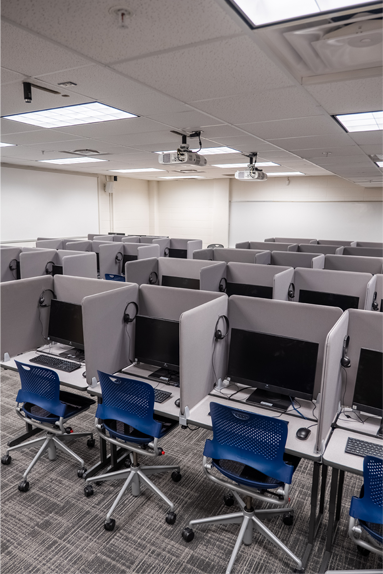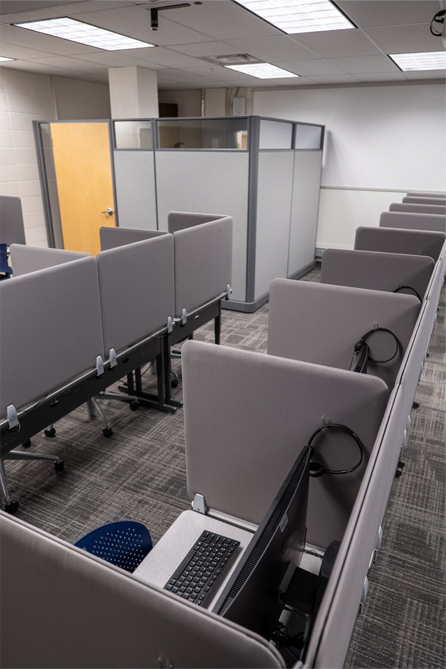Behavior Lab
Founded in 2018, the Behavior Lab is an innovative and comprehensive hub dedicated to conducting scientific research into various aspects of human behavior.
Our facilities are located in EBB 109 on the basement level of the Huntsman School of Business and are administered by the Department of Marketing & Strategy.
Research Areas
As an interdisciplinary behavioral research lab that explores human behavior within numerous domains, we welcome partnerships with industry, fellow researchers, and the broader community. By embracing diverse perspectives and interdisciplinary collaboration, we enrich our research outcomes and accelerate the pace of innovation.
Many of our current researchers support the “Better Marketing for a Better World” initiative, where their research focuses on how marketing can improve lives, sustain livelihoods, strengthen societies, and benefit the world at large. Additionally, many of the research projects being investigated in the Behavior Lab are in line with the Transformative Consumer Research movement, which includes research that benefits consumer welfare and quality of life for all beings affected by consumption across the world.
Some of the active projects in the Behavior Lab examine sustainable behavior, consumer privacy, health choices, electric vehicle adoption, public policy-based interventions, and the sharing economy.
If you are seeking researchers to collaborate with on any project, please contact the Lab Director, Dr. Matthew D. Meng (matthew.meng@usu.edu).
Lab Benefits
- Conducting complex experiments: Many experiments examining real behavior, especially those involving physical interactions or complex scenarios, are only possible in a physical environment.
- Providing a controlled environment: Our facilities have been meticulously designed to provide a neutral, controlled testing environment and minimize external influences on participants’ behavior, which improves the reliability and internal validity of generated findings.
- Observing real-time interaction: Researchers can directly observe participants' behavior, reactions, and body language in real-time, providing richer insights into their decision-making processes.
- Studying group dynamics: Researchers can study group dynamics and interactions among participants, which can be crucial for some research objectives.
- Enhancing data quality: Instructions can be provided to participants verbally as well as on-screen, and issues and questions can be addressed in real-time.
Capabilities
Our specialized facilities allow researchers to study how people think, feel, and act in various situations and environments. Research findings can generate theoretical insights into, and solutions for, real-world problems and challenges that affect individuals, organizations, and society.

- 37 individual research stations in the main room, each separated by a privacy screen.
- An isolated pair of research stations for dyadic research.
- A cluster of three research stations within a partitioned room for interactive, qualitative, and/or sensitive research.
- Observation and preparation room, with one-way mirrors, allowing for discrete monitoring of participants.
- Lab assistant terminal that can control and communicate with each individual research station.
- Adjustable lighting.
- A room-length magnetic whiteboard.
- Two digital projectors.

- Computer, keyboard, and mouse.
- Removable opaque privacy screens.
- Headphones.
- Ample desk space for physical stimuli.
- Microphone and participant-facing camera, both with recording capabilities.
- Questionnaire and survey software.
- Adjustable wheeled chair.
We also incorporate cutting-edge technology into aspects of the lab, such as:
- Biometric sensors: To measure physiological responses such as skin conductance, which provide invaluable data about people’s nonconscious and emotional reactions to various stimuli.
- Artificial Intelligence: Used to enhance various aspects of our behavioral research, such as generating unique, customized, and directly relevant stimuli, and Natural Language Processing (NLP) to extract patterns, sentiments, and themes from open-ended survey responses, interviews, and textual data.
Collecting Data
- Offering research participation opportunities to your students.
- Including your survey in our Friday research sessions.
- Running studies on other days/evenings.
- Recruiting an alternative sample.
- Recruiting a paid sample.
Services
- Research question and conceptual development.
- Institutional Review Board (IRB) protocol submissions.
- Grant application writing.
- Software and hardware tutorials.
- Methodological assistance.
- Survey design and development.
- Participant recruitment (in-person and online).
- Pretest surveys for issues and timing.
- Research session organization and supervision.
- Interview recording and transcription.
- Data analysis and visualization.
- Research presentation and communication.
- Copyediting and publication support.
- Presenting to classes about the data collection experience.
- Field study assistance.
Contact Us
- Lab Director, Dr. Matthew D. Meng
- matthew.meng@usu.edu
- Eccles Business Building, Room 410
- 435.797.4138
- Lab Assistant, Joshua Hansen


